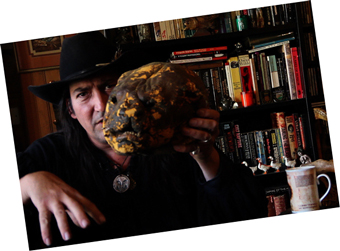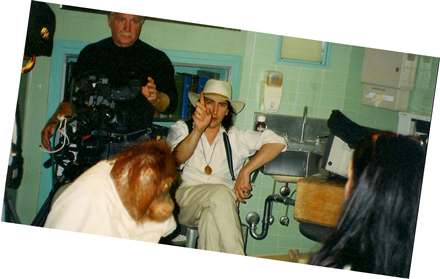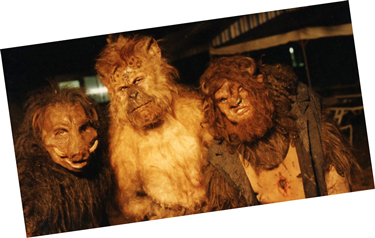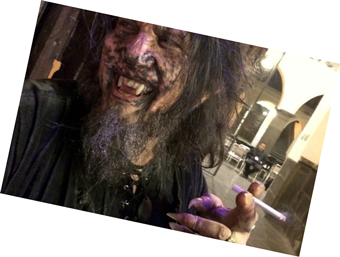|
|
Reviewed by Glenn Erickson
Real estate is all about location, and the secret to making a documentary film that will stand out from the glut of product out there is definitely the subject. David Gregory has been making documentaries to accompany horror and fantasy films for two decades now, and he's directed at least one good horror film of his own that I know of. He's also the principal partner in a home video company. Through these activities Gregory has interviewed practically every Euro-horror director, star and personality one can imagine. His lengthy video interviews with Jésus Franco are the director's final on-camera statements. Thus David Gregory was perfectly positioned to recognize a film documentary subject that, despite being centered on a box office bomb that only cult film devotees remember, has enough built-in interest to attract a wide audience.
About six years ago Gregory's company Severin released discs of a modest English sci-fi/horror offering called Hardware, directed by an eccentric artiste named Richard Stanley. That's when Gregory learned more about Stanley's abortive debacle, a big-budgeted remake of H.G. Wells' The Island of Dr. Moreau that the director managed to get funded and filming in Australia in 1994, but that fell apart due to an astounding confluence of what can be only described as 'distant location chaos.' It was called a 'troubled production,' and Stanley was labeled as a lightweight who couldn't handle his actors, the impossible Marlon
 Brando, and the Film Personality From Hell, Val Kilmer. The movie was finished, barely, by replacement director John Frankenheimer, who reportedly only took the job because his career was at low ebb. The finished film is an embarrassment watchable only to marvel at Marlon Brando's ridiculous non-performance, a spectacle that communicates little more than a contemptuous 'Fuck You' to the production, the director, and the movie business as a whole.
Brando, and the Film Personality From Hell, Val Kilmer. The movie was finished, barely, by replacement director John Frankenheimer, who reportedly only took the job because his career was at low ebb. The finished film is an embarrassment watchable only to marvel at Marlon Brando's ridiculous non-performance, a spectacle that communicates little more than a contemptuous 'Fuck You' to the production, the director, and the movie business as a whole.
Brando was gone and Val Kilmer wasn't talking, but since only twenty years had elapsed Gregory was able to contact many people connected to the picture. It was just enough time for the crewmembers to have put the experience perspective, so most were willing to talk about it. I'm assuming that Mr. Stanley cooperated fully because he was eager to see his career re-energized. The show doesn't convince me that the man's a great director, but he's also no pretender. Even if Stanley lost control of his big-break production, it looks like he had put all the puzzle pieces into place, only to be blindsided by personalities that had signed on for reasons other than making a good movie.
This isn't your average 'things-went-wrong' filming diary. Lost Soul: The Doomed Journey of Richard Stanley's Island of Dr. Moreau is one hundred minutes of jaw-dropping insanity that surpasses the accrued legends hovering over Sam Peckinpah's Major Dundee, Francis Coppola's
Apocalypse Now and even Michael Cimino's
Heaven's Gate. Compared to Richard Stanley's grief, those productions could have been easily fixed. Peckinpah needed some decent studio support, United Artists should have pulled the plug on Cimino and Coppola plucked his film out of the fire despite hitting the awful cinematic roadblock that was Marlon Brando. Richard Stanley didn't have a chance. The studio threw too much money at The Island of Dr. Moreau and insisted on hiring stars that would steamroll the relatively unknown director.
Filming at a remote beach location hundreds of miles up the Australian coast, Stanley self-destructed under impossible pressures. With enormous construction completed and Stan Winston's special effects makeup factory churning out dozens of high-quality Wells-ian Beast-Man mutants, the film needed to be shot quickly. Brando instead made production impossible, with demands for script changes, dialogue changes and even concept changes. His chosen makeup and costume ideas were absurdly, intolerably unworkable; I'd imagine that assistant directors reporting back to New Line Cinema would have a hard time describing them. Val Kilmer's demands were just as bad. The two actors refused to work together, really, resulting in scenes where little made sense.

Reporting on a sneak screening of Lost Soul at the DVD Savant main page column on September 30, 2014, I came up with a quick list of all the reasons David Gregory's docu kept its audience staring in wonderment: "The filming was a nightmare out of Lewis Carroll and Franz Kafka, involving H.G. Wells, Joseph Conrad, a 19th-century African explorer, crazy stars, warring studio heads, witchcraft, Barbara Steele, an unbelievably tiny 'miniature midget' from Spain, scores of severely gross Stan Winston monster creations, a location too remote for practicality, a demoralized film company in unending party mode, aboriginal curses, destructive floods, and a director in over his head and unsupported by most of his crew." The amazing thing is that David Gregory is able to document almost all of it, thanks to a wealth of photos and video taken by crew members.
The only hyped aspect of the picture is an opening sequence that sees the filmmakers tracking him to an artist's hideout in the French Pyrenees, as if the director were an exiled genius waiting to be called back to greatness. The show then documents everything -- the elaborate pre-production and designs, Stanley's perverse but logical visual concepts of animals being transformed into semi-humans, the crazy wheeling and dealing that created a big production with big stars that proved to be uncontrollable by any director. Even before the brain-numbing insanity and wasted effort of filming, the show seems difficult to keep on the rails. We get testimony from all directions -- Richard Stanley, actress Fairuza Balk, producer Edward Pressman, New Line honcho Robert Shaye and dozens of crew people still dazed and amazed by events that happened twenty years ago. Ms. Balk remembers the experience as totally bizarre; producer Pressman comes off as sane & reasonable, and Robert Shaye notably less so.
The filming is comparable to Lord of the Flies, with the crew 'going native' on location. It dragged on for months. If anybody had wives or husbands waiting back home, I would imagine
 that many of those relationships would be at risk. Richard Stanley saw any hope of maintaining directorial control vanish almost at the outset, and like a deer in the headlights began to withdraw from engagement with his own show. When John Frankenheimer came in much later, it took all of his tough-guy leadership and who-knows-what just to get something filmed that would fill out a decent running time.
that many of those relationships would be at risk. Richard Stanley saw any hope of maintaining directorial control vanish almost at the outset, and like a deer in the headlights began to withdraw from engagement with his own show. When John Frankenheimer came in much later, it took all of his tough-guy leadership and who-knows-what just to get something filmed that would fill out a decent running time.
I don't want to spoil the dozens of crazy weirdnesses revealed in the docu, but here are two essential memories. One of the 'special' actors hired for the movie was Nelson de la Rosa, a sometime circus performer whose size and looks are nightmarishly alarming -- he stood less then two feet, five inches tall, weighed only 22 pounds and already looked like a half-man, half hairless mole. Brando took one look at de la Rosa and latched onto him as a sort of "Mini Me," insisting that the unusual fellow's part be enlarged, with more dialogue lines. It was almost an excuse for Brando to concentrate on something totally unproductive to his role as Dr. Moreau. Photos of Moreau and de la Rosa in costume make them look like rejects from a Fellini film, dropped for being too bizarre, too fruity.
When Richard Stanley was fired the production removed him from the set. But he snuck back and hid out a couple of miles up a creek bed, with some hangers on to the production. Some workers on the set had chosen to camp out this way as well. With the collusion of loyal makeup effects people, Stanley snuck back onto the set in costume and monster makeup, becoming a featured extra in his own movie, incognito. You couldn't invent a stranger story... but Stanley is a strange guy.
Believe it or not, Lost Soul: The Doomed Journey of Richard Stanley's Island of Dr. Moreau is an uplifting experience. What happened is so absurd that we can't help but laugh; every mistake that could possibly plague a major motion picture seems to have occurred. Yet it's not like people were being harmed, and the experience was surely something the particpants will never forget. The insane set was reportedly a 24-hour party-party resort, for months on end. I'm not sure if this show redeems director Stanley in any way, but it may help him back into the director's chair on bigger projects than he's been doing. And hopefully director David Gregory will get the career boost that he's earned several times over. At this particular moment he's the most refreshing 'activist' in the horror culture field, both documenting the genre and making his own mark in it.

Severin Films' Special 3-Disc 'House of Pain' Edition of Blu-ray of Lost Soul: The Doomed Journey of Richard Stanley's Island of Dr. Moreau has some very special extras, spread across three different formats. The Blu-ray carries the feature, which is a clean encoding with handsome new interviews, nicely recovered stills and vintage video, all graced by attractive graphics from Kyle Broom. The video has a high technical polish, and looked great projected on a large screen at the Egyptian Theater.
The Blu-ray extras include outtakes, an archived video interview with John Frankenheimer, an audio interview with Barbara Steele, a concept artwork gallery with a Richard Stanley commentary, and three featurettes. The Best of Morbido sees Richard Stanley cutting capers in full monster makeup at a Mexican film festival. The Hunt for the Compound is an effort to locate the remote shooting site. Excepting the oddly shaped mountain, almost nothing visible remains. And the 'Boar Man' actor Neil Young reads his diary of the shooting experience.
The other two discs concentrate on H.G. Wells' source novel. An audio CD gives us Richard Stanley reading the entire novel The Island of Dr. Moreau. An extra DVD has a featurette in which authority Sylvia Hardy talks about H.G. Wells film adaptations and also a featurette with Stanley talking about Wells. Stanley begins with the awkward statement that H.G. Wells invented the idea of time travel in literature; he should have stipulated time travel via a technological apparatus.
A very special extra is Insel Der Verschollenen (Island of the Lost), a 1921 silent German version of Wells' horror tale, said to be recently rediscovered. About two-thirds of this hour-long show concerns a love triangle, and there's some comedy relief from a pair of ooga-booga stereotyped black natives. Two men travel to the South Seas in a submarine -- no explanation given -- to rescue the heroine, Jane Crawford (Hanni Weisse). We eventually visit a menagerie of horrors and an ape-man (or maybe dog-man) who menaces the heroine. The mad doctor McClelland (Erich Kaiser-Titz) keeps his Chinese assistant named Fung-Lu (Nien Tso Ling) in line by rationing out the opium supply. The changing of the doc's name from Moreau indicates that this was perhaps an unauthorized production. Evolution isn't mentioned, only a sort of mix 'n' match pasting together of various kinds of animals. McClelland's big project is the Frankenstein-like fashioning of 'artificial life' in the form of a creature on an operating table that we never get a close look at. Charged to put Jane's heart into the new monster, Fung-Lu leaves her alone, and uses a tiger's heart instead. Insel Der Verschollenen was directed by Urban Gad. The main monster, identified as 'Produkt aus der Gehiemwerkstatt des Professors' is played by Umberto Guarrachino Cimaste, who played Frankenstein's monster in another 1921 Italian film.
The new documentary is also available in a one-disc Blu-ray edition.

On a scale of Excellent, Good, Fair, and Poor,
Lost Soul: The Doomed Journey of
Richard Stanley's Island of Dr. Moreau Blu-ray
rates:
Movie: Excellent
Video: Excellent
Sound: Excellent
Supplements: Many, on three discs -- see above
Deaf and Hearing-impaired Friendly?
YES; Subtitles: English (on main feature)
Packaging: Keep case
Reviewed: July 19, 2015
Footnotes:
1. I've never actually seen the 1996 version of Wells' The Island of Dr. Moreau but I've reviewed Blu-rays of two other versions: the 1932 Charles Laughton classic and the 1978 Burt Lancaster curiosity.
2. A dissenting note from Richard Kaufman, 7.21.15:
Hi Glenn, Read your review of the new doc on Richard Stanley's version of Moreau with interest. I was pretty shocked to read in your footnote that you've never actually seen the film about which the documentary was made.
I gather from your general remarks that you're not a Brando fan, which is fair enough. But his performance as Moreau was one of the better things he did late in life. One or two inexcusably silly moments aside, it's a dedicated performance about a madman who goes about his work as if what he's doing is the most natural thing in the world. It is absolutely not a performance by an actor who wasn't present and didn't give a shit. Val Kilmer, on the other hand, clearly didn't give a shit. The rapid descent of his career has made that clear.
You might find this interesting as well: In Defense of Marlon Brando and The Island of Dr. Moreau.
Despite its craziness, and it's a pretty crazy film, it's a terrific guilty pleasure with a lot to recommend it, and it's a boatload better than that 1970s piece of crap with Burt Lancaster, who was totally unsuited to the role. You never believe that Lancaster is Moreau, but Brando does a believable job with it.
It's always tempting to overgeneralize about what Brando did in films later in life, but in retrospect many of those performances have aged well. While there was much derision at the time about his casting as Jor-El in Superman, in retrospect his performance has come to be seen as the anchor for the first part of the film (the best part, in my opinion), particularly in the extended version. Missouri Breaks has also aged well -- at the time no one knew what to make of it, but seen now it's very much a film of its time and Brando gives a dedicated albeit bizarre performance.
While it was often stated that he rewrote his own dialogue and made various demands, we never really see what the original screenplay offered. His changes might well have been for the better. He wrote (improvised) most of his dialogue in Last Tango -- it's among the most compelling performances in the history of cinema. You see inside his soul, but at great cost to him.
Brando was filled with self-loathing about his profession, but he also took it very seriously... even in the small roles at the end. If you want to see him give a completely wacked out comedic performance in an absolutely insane film, try to find Easy Money. You won't believe the cast, and god knows why or how it got made (probably funding from the Canadian government). But Brando is funny as hell and has the most extensive role of his later years.
That's all I've got: Are we not Men? -- Richard

Text © Copyright 2015 Glenn Erickson
See more exclusive reviews on the Savant Main Page.
The version of this review on the Savant main site has additional images, footnotes and credits information, and may be updated and annotated with reader input and graphics.
Return to Top of Page
|

